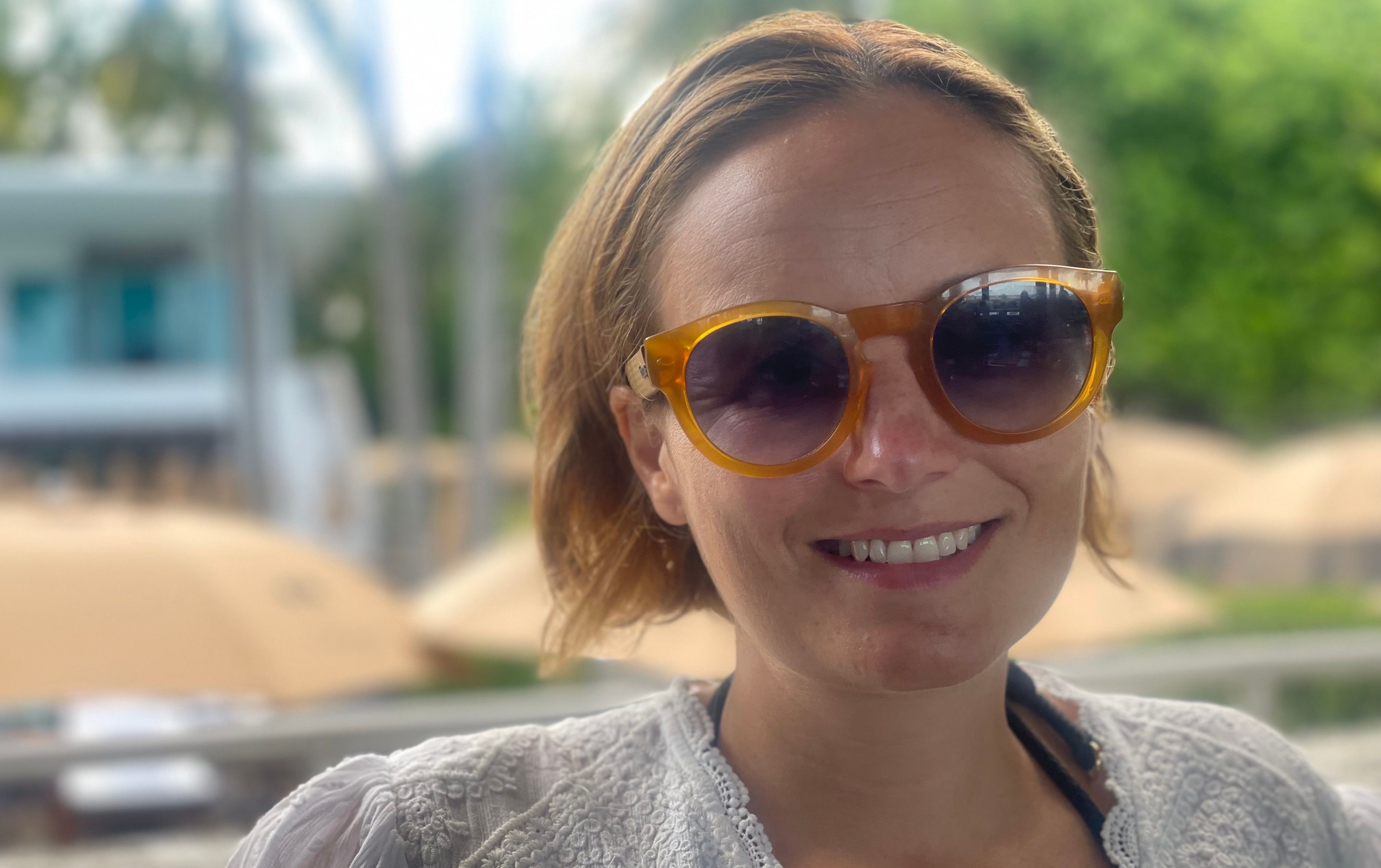
Parent Carer Collective: Lauren Fenton
by Hibi
Oct 16, 2023
Getting pissed off by shows of pity, not sweating the small stuff and spreading warm hugs to other parents of children with disability are all part of this London mum’s caregiving story.
Lauren Fenton’s second daughter, Bea, was two weeks old when her condition, 18q deletion syndrome, came into this Geordie’s lexicon. With this and various other diagnoses, Bea has hearing loss and challenges with communication, gross and fine motor skills. As Lauren says, while there are days when she wishes Bea could do more ‘typical’ things with ease, she’s a happy kid who brings a lot of joy to those around her.
Living in North West London with her husband Patrick and two children – Olivia, 10, and now eight-year-old Bea – Lauren stepped out of her corporate career in management consultancy to focus on her parenting and carer duties. As well as taking on some volunteer roles in her community, like school governor, Lauren co-hosts a podcast for fellow parents raising children with disabilities, called F**king Normal.
When we speak, she’s reading Arthur C. Brooks and Oprah’s Build the Life You Want, learning about the microbiome by “digesting” Tim Spector’s Food for Life and watching, “somewhat unoriginally”, Ted Lasso.
Read on to find out more about Lauren and her life as a parent carer. And be warned, things do get a little sweary. We are, after all, talking to the co-host of the F**king Normal podcast.
When we are expecting a child, we usually expect to be their parent, not their ‘carer’. Do you identify as a ‘carer’ to Bea?
Up until Bea was three or four years old, a lot of her difficulties were less noticeable and less limiting for her and as a result I didn’t really consider myself a carer. We could easily carry her if we needed to and she often sat in a buggy. Her frustrations resulted in meltdowns just like other children of that age and I guess I felt that supporting her needs, although definitely more significant, didn’t feel so distant away from a normal parent role.
As she grew and systems of support kicked in, the label ‘carer’ was used and I guess it is one that sums up the additional care involved with Bea. Although I do also call myself a carer, I identify first and foremost as a parent to Bea.
What does caring for Bea tend to look like on a day-to-day basis?
Currently Bea doesn’t have significant medical needs, other than managing her hearing aids, some supplements and occasional orthopaedic interventions, but she still has quite a lot of therapy and medical appointments and needs help with a lot of everyday tasks. I help her to dress, go to the toilet and with all self-care/washing activities.
Routine and schedules are very important to Bea, so we spend a lot of time supporting transitions and finding ways to clearly communicate what’s happening next. She cannot walk too far or get into a car by herself, so there is still a fair amount of lifting, which my back is not happy about!
Can you compare your initial thoughts and feelings around parenting and caring for a child with disability to how you feel now?
I was definitely in denial for the first year of Bea’s life. I refused to call my child disabled, rarely Googled anything to do with her diagnosis and felt I needed to be some sort of superwoman, not asking for help or acknowledging that there was anything significantly different about my parenting experience, despite this being the case. While I quickly formed a tight bond with Bea, I did put too much pressure on us both as I struggled to accept the fact that both she and I have limitations.
I remember one weekend, when my husband was away, deciding I would wean Bea for the first time and at the same time start to toilet train her older sister. This unnecessary stress and pressure on us by me was made more ridiculous by the fact that Bea had a cleft palate and was prone to choking and nasal regurgitation. What was I thinking?! I was clearly defaulting to a coping mechanism that had worked for me in the past – to try and control and take charge of everything, particularly when in a crisis.
Now I have learnt to let go of so many expectations that were previously ingrained in me. I won’t pretend I don’t have days where I wish it was easier for Bea, that she could communicate, dress, or do other ‘normal’ eight-year-old activities more easily, but I love the bones of her, exactly as she is. She is a happy child, who brings so much joy to our family. She completes us. I am also definitely a better and wiser person since having Bea.
What do you find most challenging about being a parent carer and, on the flipside, what brings you the most joy?
I think it’s the exhaustion of some days where something simple or ‘normal’ like trying a bit of painting with my kids goes horribly wrong. It’s also the fear of what the future will bring. Not just the fact of whether Bea will ever be able to live an independent life, but also that 3am dark shadow of a thought - what if I’m not here to look after her anymore? But I love that I don’t sweat the small stuff. It’s so liberating not to worry about exam results or whether they are doing well enough in maths! Fuck that shit!
‘Self-care’ is a bit of a dirty word in the parent-carer space, as we’re often told to do it and rarely have the opportunity. If you do manage to get an hour or so to yourself, just for you (not chores!), what do you do?
I am very lucky that I can find the time for and really enjoy running. It’s top of my list for feeling better about, well hell, everything. I also take a lot of pleasure in playing the piano when I get some quiet time and like a lot of people these days, I go cold-water swimming!
Connection with other parent carers is something you advocate for – and beautifully provide – through your podcast. What was the process like of forming your community of fellow parent carers, and what changed for you once you started forming these connections?
I have found parent-carer friends in waiting rooms, therapy sessions and school and as small groups of parent friends have amalgamated and connected further, my community has really grown.
What changed was I no longer had to pretend. It was so cathartic to form connections with other parent carers and know you could be absolutely honest about how you are feeling or what you are going through knowing that this community ‘gets it’. It feels like a big supportive hug. That’s why we started the podcast, to take that warm hug to more parents.
What do you wish other people knew about life as a parent carer?
I wish that others knew how difficult it is to get access to certain things or how much time you spend as a parent carer navigating healthcare and education systems and fighting for services for your child. It’s 2023 and yet, sadly, the hoop-jumping you have to go through to get your child into a school that is able to meet their needs is often off the scale.
I get really pissed off when people show any pity towards me or Bea. I pity them right back for their ignorance. I also do find it difficult to swallow when other parents talk about what their kids' futures will look like and how much they are looking forward to them leaving home. I get that that is my issue, not theirs – and I’m sure I put my foot in it with others, too – but please, everyone, just think a little before you speak.
What advice do you have for parents who are new to caring for a child?
I promise it will get easier. And it’s really hard to do and slightly annoying when people say it to you, but for god’s sake go easy on yourself!
Finally, what books/quotes/podcasts/TV shows/films/resources have you found relatable, inspiring and/or helpful as a parent carer?
Far from the Tree by Andrew Solomon, What the **** is Normal by Francesca Martinez, the BBC TV show There She Goes, the Netflix documentary Crip Camp and, more recently, I loved reading Go the Way your Blood Beats by Emmett de Monterey, who we had on our podcast.
Find out more about the F**king Normal podcast here and tune in wherever you like to listen to your pods.
Let’s clear out the complexities of care. Try Hibi for free here.
Want to share your parent-carer story? We’d love to hear it. Get in touch with our team at hello@hibi.health


